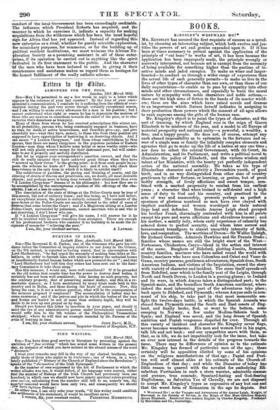BURYING IN LIME.
Lea/cells How, Ambleeide, 14th March 1855. Sin—The Reverend E. G. Parker, one of the witnesses who gave his evi- dence before the Committee of inquiry relative to our Army in the Crimea, on the 9th instant, is reported as having stated, that in conversation with Lord Shaftesbury, "he had urged the necessity of making lime-kilns at Ba- laklava, in order to furnish lime with which to destroy the unburied horses . or insufficiently-buried human bodies which now poisoned the air"; and that "Lord Shaftesbury had told him that orders had been sent out to the Beni- . tary Commission to take those steps." lffas this measure, I would ask, been well considered ? If it be grounded on the old notion that caustic lime has the power to destroy dead bodies, it • certainly has not been well oonsidered ; lime having no such property, but 'the contrary property, that of preserving animal matter, and this in a re- markable manner, as I have ascertained by many trials made both in this country and in Malta, and these during the heats of summer. Now, this being the case, is it not a serious question, what will be the consequences of the measure proposed if employed ? The accumulation of bodies may be- come enormous; and if the graves and pits in which the bodies of the men and horses are buried be not of more than ordinary depth, they will be • liable to be torn up and preyed on by dogs. Should you honour this letter by insertion in your paper, and should it meet the eye of any administrative person under Government concerned, I • -would refer him to the 9th volume of the Philosophical Transactions abridged ; where he will find an example recorded by Dr. Parsons of the • crib of burying in lime.
I am, Sir, your obedient servant, Jousr DAVY M.D.,
Inspector-General of Hospitals, H.P.


























 Previous page
Previous page